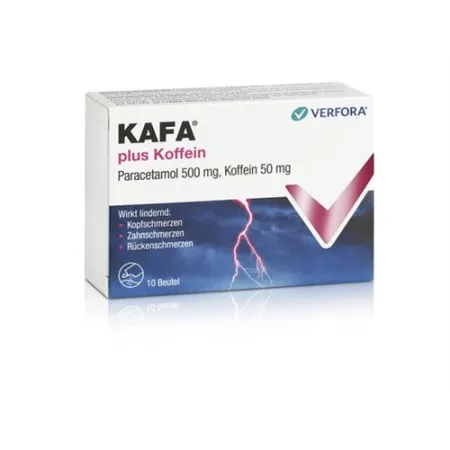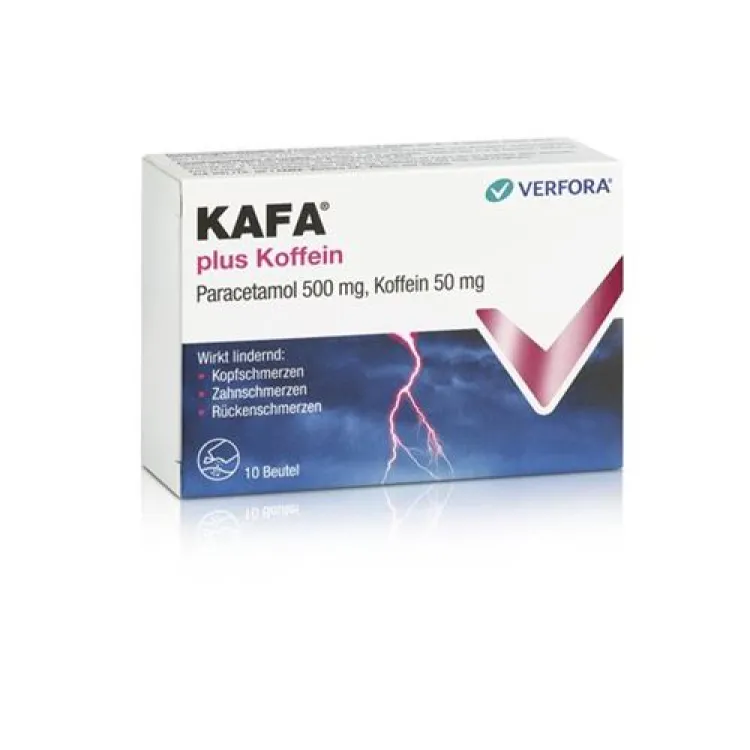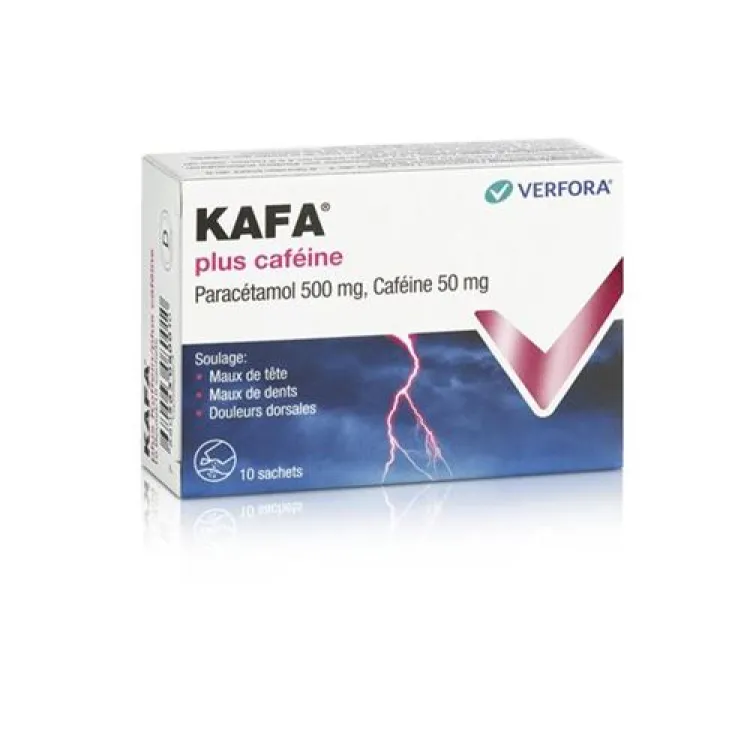DISCLAIMER: "These statements have not been evaluated by the FDA or Swissmedic. This product is not intended to diagnose, treat, cure, or prevent any disease."
Kafa plus caffeine powder bag 10 pcs
Kafa plus Koffein Plv Btl 10 Stk
-
25.37 USD

- Availability: In stock
- Product Code: 2730518
- ATC-code N02BE51
- EAN 7680563080010
Ingredients:
Description
Kafa plus caffeine contains the active ingredient paracetamol. This has a pain-relieving effect.
Kafa plus caffeine is used for the short-term Care of headaches, toothache, pain in the area of joints and ligaments, back pain, pain after injuries (e.g. sports injuries).
Ref:-approved patient information
Kafa® plus caffeine
Ref:
What is Kafa plus caffeine and when is it used?
Kafa plus caffeine contains the active ingredient paracetamol. This has a pain-relieving effect.
Kafa plus caffeine is used for the short-term Care of headaches, toothache, pain in the area of joints and ligaments, back pain, pain after injuries (e.g. sports injuries).
What should be considered?
Kafa plus caffeine should not be used for more than 5 days without a doctor's Ref:. Cares should not be taken regularly over a long period of time without medical supervision. Long-lasting pain requires a medical evaluation.
The dosage specified or prescribed by the doctor must not be exceeded. To prevent the risk of overdose, it should be ensured that other drugs taken at the same time do not contain paracetamol.
It is also important to remember that prolonged use of Cares can lead to headaches, which in turn contributes to headache maintenance.
Long-term use of Cares, especially when several Cares are combined, can lead to permanent kidney damage with the risk of kidney failure.
Note for diabetics: 1 sachet of Kafa plus caffeine contains 0.55 g sugar (= 9.9 kJ/2.3 kcal, i.e. 0.05 bread unit).
When should Kafa plus caffeine not be used?
Kafa plus caffeine should not be used:
- if you are hypersensitive (allergic) to the active ingredient paracetamol, to caffeine or to any other ingredient. Such hypersensitivity manifests itself e.g. through Wellness care for, shortness of breath, circulatory problems, swelling of the skin and mucous membranes or skin rashes (urticaria);
- in the case of severe liver diseases;
- in the case of alcohol overconsumption;
- If you have a hereditary liver disorder (the so-called Meulengracht disease).
Kafa plus caffeine must not be used in children and adolescents.
When is caution required when taking/using Kafa plus caffeine?
If you have previously damaged kidneys or liver, you should consult your doctor before taking it.
If you have a rare hereditary disease of the red blood cells, the so-called "glucose-6-phosphate dehydrogenase deficiency" and if you are taking medicines that affect the liver, namely certain medicines for tuberculosis and seizure disorders (epilepsy), or if you are Drugs that change the speed of gastric emptying (e.g. metoclopramide), or gout drugs containing the active ingredient probenecid, or drugs to treat high cholesterol containing the active ingredient cholestyramine, or certain anticoagulants, or drugs containing zidovudine used in immunodeficiency (AIDS). should only be used according to the doctor's strict instructions. You should also consult your doctor if you suffer from an irregular pulse (arrhythmia) or if you have a serious infection (e.g. blood poisoning).
The effectiveness and side effects of certain Wellness care for medicines containing the active substances theophylline or aminophylline and medicines that increase heart rate are increased, which can cause restlessness and palpitations. The effectiveness of certain sedatives containing lithium is reduced.
It is not advisable to take paracetamol and alcohol at the same time. The risk of liver damage increases, especially if you do not eat at the same time.
Individuals who are hypersensitive to Cares or antirheumatic drugs may also be hypersensitive to paracetamol (see «What side effects can Kafa plus caffeine have?»).
Excessive consumption of caffeine in the form of coffee, tea or caffeinated canned beverages should be avoided while taking kafa plus caffeine.
Inform your doctor, Ref: or druggist if you suffer from other illnesses, have allergies or are taking other medicines (even those you bought yourself!).
Can Kafa plus caffeine be taken/used during pregnancy or breastfeeding?
As a precautionary measure, you should avoid taking medicines during pregnancy and breastfeeding, or consult a doctor or Ref: or ask druggists for advice.
On the basis of previous experience, there is little known risk for the child with short-term use of the active substance paracetamol in the specified dosage.
Paracetamol is found in breast milk. Rash in breastfed infants has been reported. However, there are no known lasting adverse consequences. During pregnancy, there is an increased risk of spontaneous abortion associated with caffeine consumption. Kafa plus caffeine should therefore not be taken during pregnancy unless your doctor has given you express permission.
Caffeine could affect the infant's well-being and behavior and should therefore be avoided during breastfeeding.
Talk to your doctor before taking kafa plus caffeine while breastfeeding.
How do you use Kafa plus caffeine?
Adults: 1-2 sachets, every 4-8 hours. Stir the powder into a little water (approx. 1 to 2 dl) and drink quickly. A daily dose of 8 sachets (= 4 g paracetamol) must not be exceeded.
Immediate medical attention is required in the event of an overdose, even if the symptoms are not present.
Children and adolescents: Children and adolescents should not take Kafa plus caffeine.
Stick to the dosage given in the package leaflet or as prescribed by your doctor. If you think the medicine is too weak or too strong, talk to your doctor, Ref: or druggist.
What side effects can Kafa plus caffeine have?
The following side effects can occur when taking Kafa plus caffeine:
Rare cases of hypersensitivity reactions such as itching, swelling of the skin and mucous membranes, skin rashes up to very severe skin reactions (very rare), flatulence, Wellness care for, vomiting, nausea, sweating, shortness of breath or Wellness care for.
Changes in the blood picture, such as a reduced number of blood platelets (thrombocytopenia) or a severe reduction in certain white blood cells (agranulocytosis) have also been observed.
If skin reactions or such signs of hypersensitivity, bruising or bleeding occur, the drug should be discontinued immediately and the doctor consulted.
Caffeine can cause insomnia, restlessness and heart palpitations, especially when taken with caffeinated beverages such as coffee or cola.
If you notice any other side effects, you should inform your doctor, Ref: or druggist.
What else needs to be considered?
Keep the medicine at room temperature (15-25 °C) and out of the reach of children.
In the event of uncontrolled intake (overdose), consult a doctor immediately and immediately.
Nausea, vomiting, abdominal pain, loss of appetite, general malaise can be an indication of an overdose. However, these symptoms only appear several hours or even a day after application.
The Care product may only be used up to the date marked «EXP» on the container.
Your doctor, Ref: or druggist can provide you with further information. These people have the detailed information for specialists.
What does Kafa plus caffeine contain?
1 sachet contains 500 mg paracetamol and 50 mg caffeine as active ingredients. It contains 550 mg sucrose as an auxiliary ingredient.
Approval number
56308 (Ref:).
Where can you get kafa plus caffeine? What packs are available?
In pharmacies and drugstores without a doctor's Ref:.
Packs of 10 sachets.
Authorization holder
VERFORA SA, 1752 Villars-sur-Glâne.
This leaflet was last checked by the drug authority (Ref:) in September 2016.





